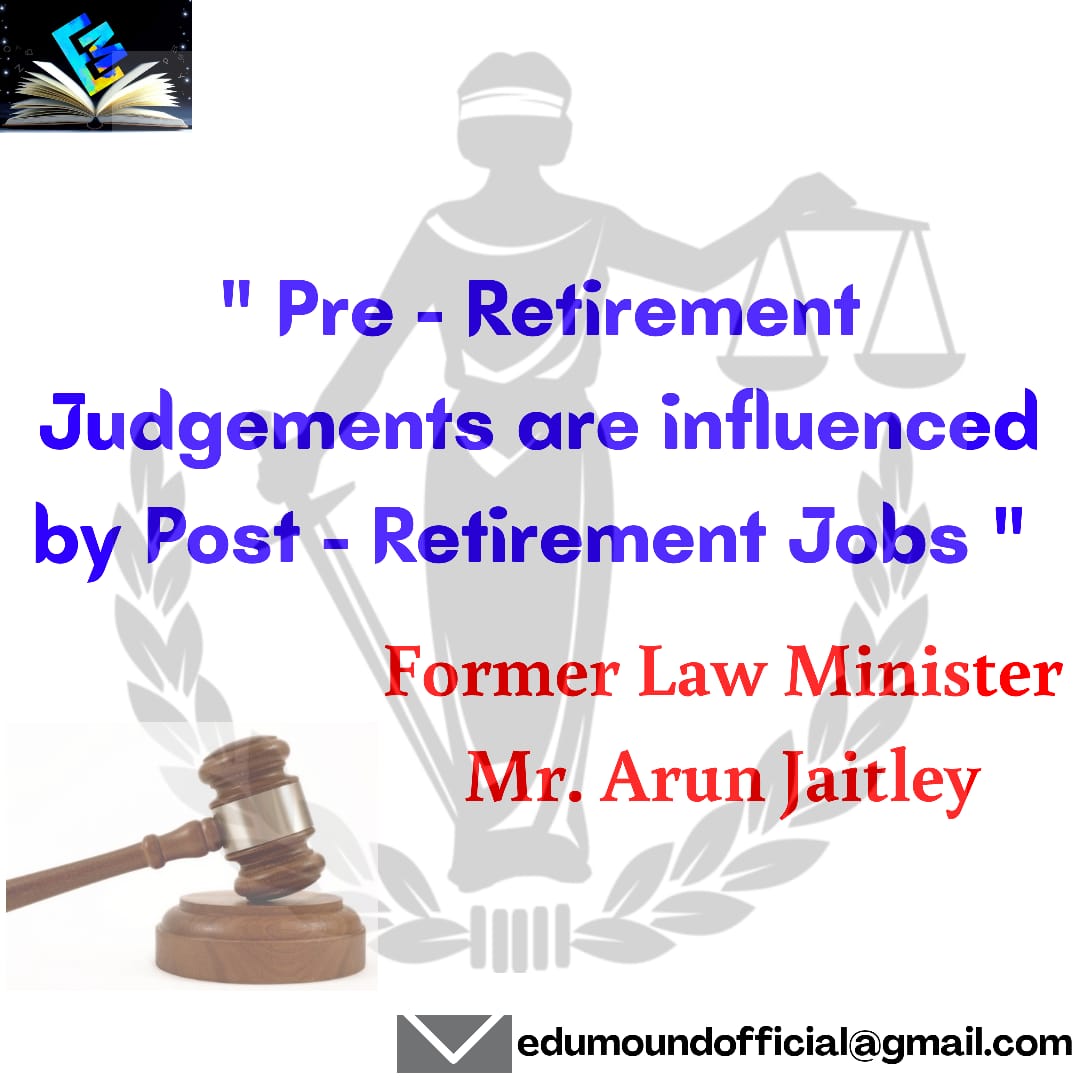
“PRE-RETIREMENT JUDGMENTS ARE INFLUENCED BY POST-RETIREMENT JOBS ” – FORMER LAW MINISTER
Pre – Retirement Judgements are influenced by Post – Retirement Jobs as said by the former Law Minister Mr. Arun Jaitley.
The principle of Independence of Judiciary, separates judiciary from the legislative and executive powers. The courts should not be subjected to improper influence from the government or due to some private interests. Independence of Judiciary is a basic feature given in the Indian Constitution. The framers of the Constitution inserted various provisions to insulate the Judicial System from the political pressure.
The Constitution of India guarantees several rights to the judicial system of India in order to keep its independence intact. The framers created such an organ of government whose only guiding force would be the Constitution which is the supreme law of land in India. They have the power to question the executive about its action as well as have the power to review the legislation and can strike it down if it is violating any provision of law.
The judges of the High Court and Supreme Court don’t hold the office at the pleasure of the government, and can’t be removed arbitrarily by the government once appointed. They can be impeached by passing a special majority of both the houses, on the ground of misbehavior or incapacity as given under Article 124(4) and 217(1)(b). The salary and the age of retirement, are all guaranteed under the Constitution, so that their independence is secured.
The retired Supreme Court judge can not plead in any court or authority within the territory of India. But this demarcation between the executives and the judiciary got obscured as a number of judges from many years now have started to acknowledge posts offered by the administration or the government. It was felt that on retirement from a high constitutional office, the judge would live a retired life. No one at any point anticipated that they would acknowledge such a plum post.
The separation of power between the Executive and the Judiciary is the most important feature for determining the Independence of Judiciary. But people are fast losing the confidence in the so-called Independence of the Judiciary. Former Union Minister Arun Jaitley said on the floor of Rajya Sabha that every person wants a job after retirement, thus if the parliament doesn’t create such post retirement jobs for the judges, they would themselves create it. And when such a job offer is presented to the judges, it affects their decision on their pre retirement judgments. Which poses a serious threat in undermining the functions autonomously and without any pressure.
It does not suggest that the decisions made by the judges are wrong or biased, but there is a silver lining that post retirement appointments have impact on their judgments, irrespective of their merits. It is often said that presence of actual bias is not necessary to consider the sanctity of the decision; the perception of bias is enough to contaminate the decision.
When the judges accept the jobs of the executives there is a conflict of interest as the judiciary has the power to strike down the legislations passed by the government. So, normally no person wants any kind of displeasure with the government in their last year of tenure. Thus, making decisions that would strike an equal balance in their relation to get a favourable post retirement position.
Like in the Ayodha Case (M. Siddiq v. Mahant Suresh Das) Justice Ranjan Gogoi, have a balanced decision on the disputed land of Ram Mandir, taking into consideration the religious believes of the people; giving the disputed land to a trust and pushing way for the construction of Ram Mandir and giving a separate land to Muslim Board within the state to construct masjid. Not every judge accepts the post retirement job, one such was Mohammad Hidayatullah, who ruled against the government and held the abolition of Privy Purses as illegal.
The Law Commission in it’s 14th Report in 1958, noted that retired Supreme Court judges used to engage in two kinds of work after retirement i.e. either Chamber practice ( giving opinions to clients and serving as arbitrators in private disputes) or Employment in Executive positions.
However, it strongly recommended a ban on post retirement jobs or government employment for Supreme Court judges as the government was a large litigant in the courts. Although being a member to the Rajya Sabha is not a job but a service for which the President nominates a person who has special knowledge in literature, science, art and social service according to Article 80(3). So doing an executive job after retirement from the position of judge does not violate any law but it weakens the belief of the citizen on the judicial system.
It is high time to bring in constitutional prohibition for the judges to accept the post retirement jobs immediately. Appointment of those people who have held a notable position may undermine the dispensation of justice.
To bring back the confidence of constitutional democracy, law needs to be passed by either constitutional amendment or parliamentary enactment barring such appointments. There needs to be a cooling period of two to three years so that the decisions that are made by the judge in the last few cases of his tenure do not have a glitch of biasness. Judges can be given compensation for their last drawn salary as pension. Also, the age of retirement for judges can be increased by a year or two. This would prevent the damages caused by the post retirement jobs, it must also be noted that judges are only the constitutional servants, not the government servants.
For more information Visit Our Site
To submit your work Connect With US






